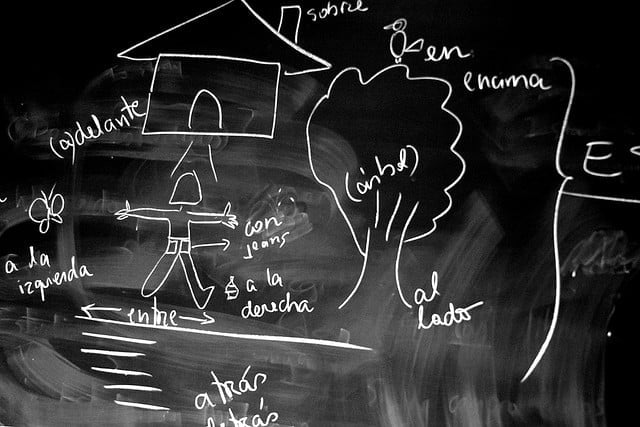“Hola, clase!” my young and peppy Spanish professor said, sing-songy, as she darted into the classroom. As I scanned the room, what I saw surprised me: the wide, confused eyes of my classmates; paper schedules in hand; no one speaking with anyone. Could it be? Yes. It was true! I was in a classroom full of freshmen–and they were my peers. In a flash I felt older than my 30 years. Here I was, a graduate student taking introductory Spanish–listed as SPAN 101 in the course catalog–and I had a feeling, almost immediately, that I had made a terrible mistake. Even my peppy professor was younger than me!
The semester began simply enough, with short phrases in Spanish: What is your name? How many years do you have? (technically ‘How old are you?’ but the neo-linguist in me heard everything literally.) Where are you from? Soon we were progressing to foods, colors and preferences: What is your favorite vegetable? Least favorite color? Your favorite musical artist?
My 18-year old peers seemed to handle name and place of birth alright. After all, these were basic facts. Once we got to preferences, however, the whole landscape changed. These bright and easygoing young men and women suddenly became coy, rigid and easily embarrassed. They stammered, turned red and responded “I don’t know” with increased regularity, frozen by a palpable fearfulness, not that they didn’t know the language, but that they wouldn’t give answers acceptable to their peers. I marveled at the sudden change in their demeanor, the way they looked at others when deciding what vegetable would be considered acceptable, and which type of music was deemed cool in the eyes of their classmates.
18 years old. I remember that time: I desperately wanted to be cool and existed far from any objective definition of the word. I measured every word, every walk and gesture hoping to convince others that I was a member of the club, at least partly-cool. Mercifully, I don’t recall a lot of specifics, but I remember that trying to be cool was exhausting because I was trying to combat my fears of being uncool by faking it, living in untruth. As I tried to be something I wasn’t, I found myself increasingly tired. I was spending all my energy constructing a self instead of simply being myself.
I recognized this pitiful pattern in my Spanish class peers at just about the same time as I remembered that I wasn’t 18 years old anymore. The realization was very liberating. ‘What is your favorite food, Keith?’ No longer concerned whether my peers thought me cool or not, I gave answers that were both truthful and truth-seeking, for what was most important to me was to learn this new language. ‘How do you say eggplant, Profesora?’ (Yes, I know many think it’s slimy and gross, but I think it’s delicious!) ‘And does the penultimate syllable still get the stress when I pronounce the proper name of Regina Spektor?, because that’s who I’m listening to these days.’ (Her music may be cheeky and odd to many, but I rock out to it.) My answers may have been decidedly uncool, but I was having fun and learning because I was being me.
I’m over 30 years old now and among the many things I’ve come to realize is that I still don’t know what cool is and I still exist far from it. But with the gifts of time and growth, I’ve been able to recalibrate what it is that’s most important to me. I still have wants and desires, but they no longer include the desire to be ‘cool.’ And I still have fears. But what I’m afraid of now is not what I was afraid of then. I’m increasingly better at starving my fears rather than feeding them.
I was nervous at first when I walked into that class with those younger peers, but I find myself grateful in retrospect. After all, in this experience time and grace offered me the chance to be the freshman I never was and, I must say, I think that’s pretty cool.
***
The cover image, from Flickr user , can be found here.



